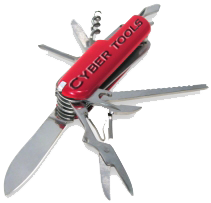Latest News
First 'All-hands' Meeting
On October 18th, the first All-hands Meeting for the NSF RII award took place in Baton Rouge. As members of the RII Advisory Board, Ron Hutchins, Jordan Konisky, and Vince McCoy were present. Two of the LONI Institute fellows attended the meeting as well. You can download presentations of Drs. Allen, Cortez, Gaver, Khonsari, and Seidel. Here are pictures and a few more details on the meeting. [Other News]
Deliverables and Milestones for Work Package 4
CFD and MD Toolkits: We will develop a parallel, Cactus-based CFD Toolkit capable of supporting all CFD work in the project, ultimately building a worldwide community of users, providing support for many different fluid systems, equations of state, geometries, grid structures, and CFD application domains. Similarly, we will create a Cactus-based MD toolkit to be used by the sensor projects.
SAGA adaptors and Cactus-SAGA thorns: We will develop a set of Cactus thorns using SAGA libraries for operations needed by the science projects, including services for advertising runtime information about an application, and for data streams, as well as metadata descriptors. All applications will be able to use the services developed to send complete metadata about simulations to the distributed data archives. SAGA adaptors will be developed for all LONI services, including most popular grid/HPC software and all higher level LONI services.
Molecular Simulations: We will facilitate the development of a LONI environment that supports resource intensive high-throughput molecular dynamic simulations (all-atom to coarse-grain), analysis and visualization. This will be critical to the success of the geno/immunosensors science driver. While each simulation, on its own, is an HPC event, the aggregate set of simulations requires the utilization of the entire grid in a coherent, but not parallel/synchronous fashion. We will develop the methods by which simulations will be farmed out to the LONI sites as HPC events that are localized to each site.
Computational Fluid Dynamics (CFD): We will use the Science Drivers to motivate the development of CFD methods for the simulation of viscous and inviscid flow and transport in irregular and compliant geometries. When incorporated into the CyberTools CFD toolkits, this will facilitate the development of biosensors, the analysis of flow in the retinal system and storm-surge calculations. These tools will exploit the HPC environment provided by the LONI infrastructure. In Year 3, the tools will be generally available and will be used by at least four research groups throughout the state. Furthermore, these tools will be used in graduate-level courses at LONI.
[ Back to top ]
